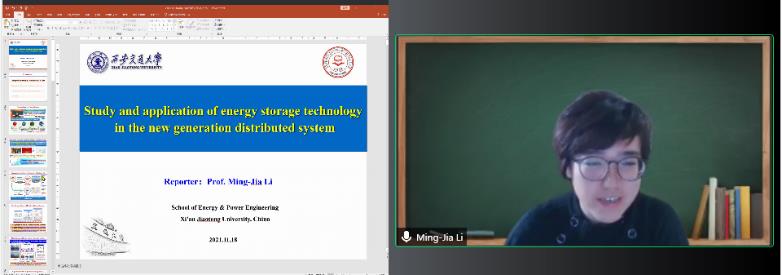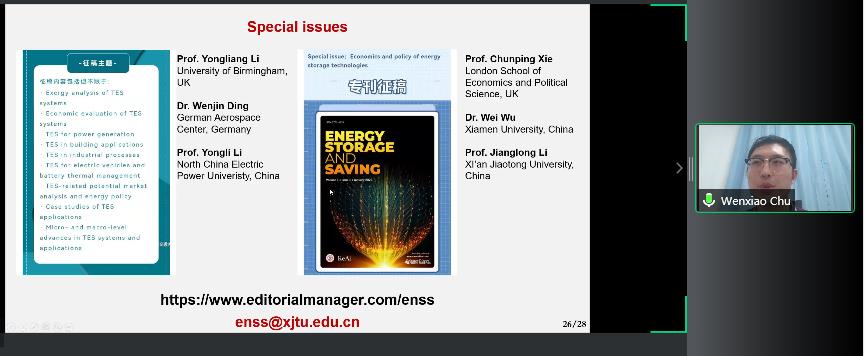To deepen the cooperation in energy, power and environment fields, the School of Energy and Power Engineering at Xi’an Jiaotong University launched the ESA-UASR in 2018. The ESA-UASR is a non-governmental, non-profit and international higher education sub-organization under the framework of UASR. It provides a cooperation platform for the energy, power and environment related schools and departments in universities or other academic institutions. It aims to promote the student training, academic exchange and scientific research among ESA-UASR members. Up to now, nearly 60 universities from 20 countries and regions have participated into the alliance. As a part of this year’s annual event of UASR, the ESA-UASR hold a symposium with the topic as Energy Storage and Saving on Nov. 18, 2021. Due to the influence of COVID-19, four distinguished young scholars were invited to deliver keynote presentations visually in ZOOM platform. Prof. Qiuwang Wang, who is the executed director of ESA-UASR has chaired the symposium and given a brief introduction about the recent works of ESA-UASR.

Then, Dr. Ho Seok Park first presents his recent achievement with topic of 2D Pseudocapacitive Nanomaterials for High Energy- and High Power-Oriented Applications of Supercapacitors. Prof. Park is a professor of Chemical Engineering at the Sungkyunkwan University (SKKU), an adjunct professor at the Samsung Advanced Institute for Health Science & Technology (SAIHST). He used to work as a Postdoctoral Researcher in the Department of Biological Engineering at MIT from 2008 to 2010. His current research interests focus on energy storage and conversion based on 2D and carbon nanomaterials. Supercapacitors (SCs) are an electrochemical energy storage device that can fill the gap between batteries and electrolytic capacitors. However, the widespread applications of commercialized carbon-based SCs are limited by their energy density, arising from their physical charge storage mechanism, which is by far lower than that of batteries. Firstly, he addressed their contribution to the improvement of pseudo-capacitance by the molecular level surface redox sites of 2D pseudocapacitive nanomaterials such as P-doped graphene and black phosphorus. In addition to energy aspect, he focused on the kinetics feature of 2D MXenes, correlating with the multiscale structure and chemistry for ultrahigh power and high frequency response.

The second keynote speaker is Prof. Yongliang Li. Professor Yongliang Li is a Chair of Thermal Energy Engineering in the School of Chemical Engineering and the Birmingham Centre for Energy Storage at the University of Birmingham, UK. His research focuses on thermal energy conversion, storage, and thermal management. He has published 100+ peer reviewed articles with a h-index of 32. He has won several prestigious awards including the Dorothy Hodgkin Award, the CSC Award, and the Collaborative Development Award for his academic achievements. Prof. Yongliang Li gave a talk with the topic of Microencapsulation of phase change materials for cold energy storage applications. He introduced their works on the microencapsulation of volatile phase change materials, covering both the formulation process and mechanism, as well as the thermal and theological behaviors of the MPCMS and its slurry.

Subsequently, Prof. Mingjia Li. Mingjia Li delivered a presentation titled Study and application of energy storage technology in the new generation distributed system. Prof. Mingjia Li is a professor of School of Energy and Power Engineering, Xi’an Jiaotong University. She was awarded international awards and national awards such as Asian Young Scientist Award, National Young Top-notch Talents Program, Thousand Talents Program of Shannxi Province, and some other awards. She mainly focuses on Energy-saving theories & new methods in efficient energy utilization, Supercritical CO2 power system and Biomass carbon sequestration. She published many journal papers with the h-index of 34, and 13 of them are selected in ESI papers. A total of 26 patents of invention and 7 software copyrights have been authorized. She introduced some dominant technologies of storage material and storage structure that are practically analyzed. Besides that, the dynamic response characteristics of the power generation frequency and efficiency of the energy storage system with a microgrid real-time load were also discussed.

The forth keynote speaker is Dr. Lizhong Yang. He is a research associate at the Thermal Energy Systems Lab and Surbana Jurong – NTU Corporation Lab in Nanyang Technological University, Singapore. His research focuses on renewable energy and energy saving-related topics, including thermal energy storage technologies, concentrating solar power, carbon capture, data center energy saving and poly-generation, liquefied natural gas cold energy recovery and utilization. He provided audients a systematic and comprehensive review of a wide range of existing and potential cold thermal energy storage materials at sub-zero temperatures (from around −270 °C to below 0 °C). Current and future applications of cold thermal energy storage materials, including recovering waste cold energy, enhancing refrigeration systems’ performances, and improving renewable energy integration, were investigated with compatible storage materials. Moreover, by identifying the research gaps where further efforts are needed, he also outlined the potential development directions of the next generation cold thermal energy storage materials.

Eventually, Dr. Wenxiao Chu introduced the development of the new journal named Energy Storage and Saving (ENSS), which is organized by Xi’an Jiaotong University collaborating with Elsevier. The UASR gives a big international platform as well as strong supports to the development of ENSS.
Since December in 2020, ENSS started planning, and then, the associated editor (AE) team was organized and we hold the AE meeting on Jan.26, 2021. After the editorial board members prepared, an excellent launch event for ENSS was hold subject to the 125th birthday celebration of Xi’an Jiaotong University. The Vol. 1, No. 1 of ENSS is scheduled to launch in January 2022. Currently, the special issue with the topic of energy analysis of thermal energy storage systems are calling for papers, which is organized by Prof. Yongliang Li (University of Birmingham, UK). Another special issue is organized by Prof. Chunping Xie (London School of Economics and Political Science, UK), editing with the topic of economics and policy of energy storage technologies.

On Sep. 26th 2021, ENSS was selected as the Excellence Initiative Project of Chinese S&T Journal. A total of 166 applications are submitted and we eventually selected as the top 30. That means ENSS has got the strong support from the government. Meanwhile, ENSS is a FREE open access journal, and Xi’an Jiaotong University will pay the Article Publishing Charge for each accepted article. The homepage in Editorial manager system for submitting your manuscript to ENSS.
https://www.editorialmanager.com/enss
Welcome to contact to enss@xjtu.edu.cn
